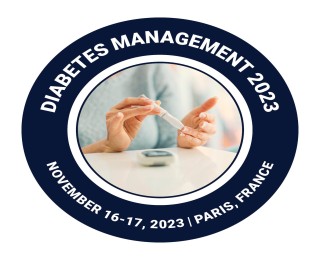Welcome Message
Welcome’s you!!
We cordially invites to all scientists, students, academicians, delegates; research scholars anticipate aim to all over world at our scientific collaboration “7th Annual Conference on Diabetes and Endocrinology”, held at paris, France during November 16-17, 2023 along the theme “Diabetes is not a choice, but how I live with it is.”
About Conference
About conference:
You can acquire diabetes if your blood glucose, also referred to as blood sugar, is too high. Blood glucose, which is obtained from the food you eat, serves as your body's main energy supply. The pancreas makes the hormone insulin, which makes it easier for your cells to absorb glucose from meals and use it as fuel.
Diabetes is a persistent disease that affects how well your body uses food as fuel.
Your body converts the majority of the food you eat into sugar (glucose), which is then discharged into your bloodstream. When your blood sugar levels increase, your pancreas produces insulin. Insulin acts as a key to allow blood sugar to pass into your body's cells and be used as energy.
Your body either produces inadequate insulin or uses it incorrectly if you have diabetes. When insulin is insufficient or when cells stop reacting to insulin, too much blood sugar stays in the bloodstream. In the long run, this can result in serious health problems like kidney disease, vision loss, and cardiac disease.
The endocrine system is the focus of the biological and medical discipline of endocrinology. The pituitary, thyroid, adrenals, ovaries, testicles, and pancreas are a few of the parts that make up the endocrine system. Hormones are released into the blood by these organs. Endocrine system hormones have a wide range of functions, and based on the organ they are targeting, some hormones may have different effects. Different hormones may target specific organs.
Diseases of the endocrine system are referred to as endocrinopathy or endocrinosis. However, these issues are frequently referred to as hormone abnormalities. In endocrinology, disorders of this system may be identified and treated. Clinical chemistry and biochemistry expertise are necessary for diagnosis, which frequently involves assessing for a variety of symptoms.
Why to Attend:
Diabetes and Endocrinology meetings are a prominent interdisciplinary venue for academics, scientists, practitioners, and educators to present and discuss the latest developments, trends, and concerns, as well as practical issues and solutions in the fields of Diabetes and metabolism, Thyroid disease, Endocrine oncology, Neuroendocrinology, Follicle-stimulating hormone, Gonadotropins and so on.This would be the right platform for scientists and others in oncology and cancer to exhibit their current research developments and ascertain their magisterial progress in oncology.
Target Audience:
This activity is designed for family practice, primary care, internal medicine, and interested sub-specialty physicians as well as pharmacists, physician assistants, registered nurses, nurse practitioners, dietitians and other interested health care professionals.
Sessions And Tracks
Track 01: Diabetes Mellitus:
• Diabetes mellitus is a condition in which the body does not make enough or utilize insulin as it should, leading to abnormally high blood sugar (glucose) levels.
•Type 1, type 2, gestational diabetes (diabetes during pregnancy), and prediabetes are the four major types of diabetes.
Diabetes symptoms include:
• Dry lips and increased thirst (polydipsia).a lot of discharge,Fatigue.view that is hazy, Loss of weight without cause. Tingling or numbness in your feet or limbs.
•Diabetes, irrespective of the form, is caused by an excess of glucose in the blood. However, based on the type of diabetes you have, there are different causes for high blood glucose levels.
Diabetic causes include:
Immune disorder, Insulin sensitivity,hormonal irregularities ,genetic changes.
Track 02: Diabetes: Internal Medicine and Primary Care:
Internal medicine is a medical specialty in which physicians apply scientific knowledge and clinical expertise to diagnose and treat adults with a very broad range of health concerns and diseases. Internists or general internists are medical professionals who specialise in internal medicine.
Primary care clinicians play a crucial role in early diagnosis, development of efficient treatment plans, and care coordination because they are frequently the first and most frequent points of interaction for people with type 2 diabetes who are at high risk of cardiorenal disease.
Track 03: Pediatric Diabetes:
Your kid has paediatric diabetes if their blood sugar, also known as glucose, is too high.
Our primary source of energy is sugar, which is derived from the food we consume. The pancreas' hormone insulin aids in delivering the sugar to our cells where it is converted to energy. Insulin can't reach the cells if your child's body doesn't produce enough of it or utilises it poorly, which leads to high blood sugar levels. Diabetes may be brought on by high blood sugar levels.
Diabetes comes in two varieties:
Diabetes type 1:
Because the immune system attacks the cells in the pancreas that generate insulin, the body is unable to produce it. Every day, children with type 1 diabetes must consume insulin.
Track 04: Genetic diabetes:
Genetic mutations that cause diabetes affect proteins that play a role in the ability of the body to produce insulin or in the ability of insulin to lower blood glucose. People typically have two copies of most genes, with one gene inherited from each parent.
Monogenic diabetes is caused by mutations, or changes, in a single gene. These changes are usually passed through families, but sometimes the gene mutation happens on its own. Most of these gene mutations cause diabetes by making the pancreas less able to make insulin.
Track 05: Artificial Intelligence: The Future for Diabetes Care
The area of artificial intelligence (AI), which is rapidly expanding, has applications that could revolutionise how this chronic condition is diagnosed and managed. Diabetes is a global pandemic. Algorithms supporting predictive models for the chance of developing diabetes or its complications have been developed using machine learning principles. Digital therapeutics have established themselves as a lifestyle therapy tool for the control of diabetes. Clinical decision support is helpful for both patients and healthcare workers as diabetes patients are given more autonomy to self-manage their condition. AI makes it possible to continuously and easily remotely watch a patient's symptoms and biomarkers.
Track 06: Infertility & Reproduction Health Care
Infertility is a situation where you are unable to conceive after a year of trying. Endometriosis, uterine fibroids, and thyroid illness are just a few examples of female infertility causes. poor testosterone or poor sperm counts may be present in men who are having fertility issues. The likelihood of sterility rises with age.
In all matters pertaining to the reproductive system and to its functions and processes, reproductive health is a condition of total physical, mental, and social well-being and not simply the absence of disease or infirmity.
Track 07: Insulin Resistance & Insulinotherapy
The pancreas secretes the hormone insulin, which instructs your cells to let that sugar into them so they can use it as fuel. When there is insulin resistance, the cells do not respond and do not expand, which causes the blood sugar to be too high.
The insulin that the body would typically produce is replaced by insulin therapy. Diabetes type 1 patients are required to consume insulin daily. When other medications and treatments for type 2 diabetes are unable to regulate blood sugar levels, insulin must be taken.
Track 08: Diabetic Nutrition and Diet:
Simply adhering to regular mealtimes and consuming the healthiest foods in moderation constitutes a diabetes diet. A diabetes diet is a balanced, calorie- and fat-free eating regimen that is inherently high in nutrients. Fruits, veggies, and whole grains are essential components.
Track 09: Diabetes: Advanced Technologies and Treatments
The conference on advanced technologies and treatments for diabetes (ATTD) provides a forum for the debate of cutting-edge medical innovations for the management and prevention of diabetes.
Horizon is a closed loop device, also known as Artificial Pancreas technology, similar to Tandem's Control-IQ. It uses a clever algorithm to link the Omnipod tubeless patch pump to a CGM, enabling automatic adjustments to insulin dosing.
Track 10: Thyroid Disease:
A tiny tissue called the thyroid is found in the front of the neck, encircling the windpipe. (trachea). It has two broad wings that wrap around the side of your neck and is shaped like a butterfly with a smaller middle. an organ, the thyroid is. Your body contains glands, which produce and discharge substances that aid various bodily functions. Your thyroid produces chemicals that assist in regulating a number of important bodily processes.Your complete body may be affected if your thyroid isn't functioning properly. Hyperthyroidism is a disease that can occur if your body produces excessive amounts of the thyroid hormone. Hypothyroidism is a condition in which your body produces insufficient thyroid hormone. Both diseases are severe and require medical attention
Track 11: Obesity and Metabolic Syndrome:
Abnormal or excessive fat accumulation that poses a danger to health is what is meant by the terms "overweight" and "obesity." Overweight and obesity are both defined by a body mass index (BMI) of over 25, respectively.
Obesity is typically brought on by excessive food and insufficient exercise. A large portion of the excess energy will be stored by the body as fat if you ingest large amounts of energy, especially fat and sugars, without expelling it through exercise and physical activity.
a group of illnesses that raise the chance of diabetes, heart disease, and stroke.Hypertension, diabetes, extra body fat at the waist, and abnormal cholesterol levels are all symptoms of metabolic syndrome. The condition raises a person's chance of having a heart attack or stroke.Other than a big
Track 12: Osteoporosis Health Care:
When bone mass, bone mineral density, or the composition and strength of bone change, osteoporosis, a disorder of the bones, results. This may result in a loss of bone density and an elevated chance of fractures. (broken bones).
Both genders can be impacted by osteoporosis. Although it can affect younger people as well, it is more prevalent in older people.
Because menopause-related hormonal changes directly impact bone density, women are more likely than men to acquire osteoporosis.
Bone health depends on the feminine hormone oestrogen. Oestrogen levels decrease following the
menopause. This may cause a sharp drop in bone mass.The majority of the time, men's osteoporosis has no recognised cause.
Track 13: Clinical Endocrinology
Understanding the endocrine system, its function, and its diseases or abnormalities as they pertain to patient care is known as clinical endocrinology. The testes and ovaries, the pancreas, the pituitary gland, and the thyroid gland are examples of the body organs that release hormones that control a number of the body's functions. The endocrine system is made up of all of these organs. Endocrinologists frequently handle the following conditions: Diabetes, Adrenal disorders, Osteoporosis and bone health, Diabetes, Endocrine disorders in children (lack of growth, puberty issues), and Heart issues. (high cholesterol, triglycerides, high blood pressure). Diabetes is a condition that endocrinologists may be very acquainted with. They focus on patient care and comprehending insulin control.
Track 14: Female Reproductive Endocrinology:
The study of hormones and neuroendocrine elements that are released by or have an impact on reproductive organs is known as reproductive endocrinology. The hypothalamus, anterior pituitary, ovary, endometrium, and placenta are some of these organs.The traditional definition of a hormone is a cell product that is secreted into the peripheral circulation and acts on a faraway target tissue. Endocrine secretion is the word for this. In reproductive physiology, additional types of cell-to-cell communication occur. The term "paracrine communication" refers to chemical signalling between adjacent cells, which is prevalent in the ovary. When a cell secretes compounds that affect how it functions, this is known as autocrine communication. An intracrine effect is when a substance is produced within a cell and effects the cell prior to secretion.
Track 15: Hypoglycemia:
Your blood sugar (glucose) level is below the normal limit if you have hypoglycemia. Your body uses glucose as its primary energy source. Hypoglycemia and diabetes management frequently go hand in hand. Low blood sugar can, however, occur in individuals without diabetes due to a variety of conditions and other medications, many of which are uncommon.
Track 16: Endocrine-Disrupting Chemicals
The network of glands and organs that create, store, and secrete hormones is known as the endocrine system. The endocrine system regulates your body's healthy growth and function throughout your existence when it is operating normally.
EDCs are chemicals that interfere with the regular operation of your body's endocrine system and are found in the atmosphere (air, soil, or water supply), food sources, personal care products, and manufactured goods. People are exposed to EDCs in a variety of ways because they originate from numerous sources, including the air we breathe, the food we eat, and the water we drink. Skin contact is another way that EDCs can infiltrate the body.
Track 17: Neuroendocrinology:
The study of the neuroendocrine system, which is the interplay and communication between the nervous and endocrine systems, is known as neuroendocrinology. Brain regions are in charge of regulating the release of various hormones into the body, which in turn serves to control blood pressure, metabolism, how our body burns energy, and other bodily processes.
Track 18: Pediatric Endocrinology:
A medical subspecialty called paediatric endocrinology works with endocrine gland disorders, such as diabetes and variations in early children's physical and sexual development.
A subspecialty of paediatrics known as paediatric endocrinology aims to diagnose and manage conditions that impact children's endocrine systems, such as thyroid, adrenal, bone, and calcium issues, diabetes, growth disorders, and puberty problems.
Track 19: Stem Cell treatment in Diabetes:
Patients with diabetes mellitus have a great deal to gain from stem cell treatments. The phases of development and transcription factors involved in this process have been identified through research on the capacity of human embryonic stem cells to differentiate into islet cells. However, ethical questions and the potential for teratoma formation restrict the clinical applications of human embryonic stem cells. Alternative stem cell treatments, such as induced pluripotent stem cells, umbilical cord stem cells, and mesenchymal stem cells derived from bone marrow, have consequently attracted a great deal of research. Recent developments in stem cell therapy could make this a viable diabetes remedy in the near future.
Track 20: Steroid Hormones and Receptors:
Steroid hormone receptors (SHR) function as nucleus transcription factors that are hormone-dependent. The hormone (H), which enters the cell through passive diffusion, contacts the receptor after it is released from heat shock proteins and translocates to the nucleus.
Market Analysis
Market Analysis:
The global diabetes therapeutics market was valued at $118,063.3 million in 2020 and is projected to reach $317,915 million by 2030, growing at a CAGR of 10.4% from 2021 to 2030. Diabetes is a chronic, metabolic disease characterized by elevated levels of blood glucose that cause serious damage to the heart, blood vessels, eyes, kidneys, and nerves. Diabetes therapeutics are medications used for the treatment of diabetes. They include human insulin analogs and oral-antidiabetic drugs (OAD).
The COVID-19 outbreak is anticipated to have a negative impact on the growth of the diabetes therapeutics market. There was implementation of lockdown to control spread of COVID-19. Many hospitals were converted into COVID 19 centers due to which diabetics faced delays in treatment. For instance, according to the World Health Organization (WHO) report, as of December 19, 2021, over 273 million cases and over 5.3 million deaths have been reported globally. Furthermore, entire healthcare sector’s focus shifted toward COVID-19. Thus, COVID-19 adversely affected the growth of the diabetes therapeutics market.
The global diabetes therapeutics market size is majorly driven by the increase in the prevalence of diabetes, an increase in sedentary lifestyles, and a rise in the prevalence of other chronic diseases such as hypertension. For instance, according to the International Diabetes Federation (IDF), was reported that approximately 537 million adults (20-79 years) are living with diabetes, and the number of diabetic patients is projected to rise to 643 million by 2030 and 783 million by 2045. As a result, the increase in the prevalence of diabetes in the population contributes to the diabetes therapeutics market growth. Furthermore, diabetes can be inherited and is linked to patients’ family history and genetics. It is not necessarily inherited by everyone, but people with a family history are likely to develop diabetes. In addition, growth in awareness among the population about self-management of diabetes contributes to market growth. Moreover, the development of affordable and effective diabetes therapeutics such as oral hypoglycemic agents and government initiatives to provide diabetes care facilities drive the growth of the market.

Associations And Societies:
American Diabetes Association.
American Association of Clinical Endocrinologists
American Society of Endocrine Physician Assistants
Endocrine Society
Society for Endocrinology
National Institutes of Health
National Institute of Diabetes and Digestive and Kidney Diseases
American Diabetes Association
American Society for Reproductive Medicine
American Thyroid Association
The Obesity Society
Sexual and Reproductive Health Section of the APHA
Society for Reproductive Endocrinology and Infertility
Universities:
Imperial College London
University of Copenhagen
University of Oxford
University of Toronto
University of Cambridge
Harvard University
University of Texas Southwestern Medical Center Dallas
Yale University
University of Sydney
University College London
Stanford University
Karolinska Institutet
University of California San Francisco
University of Pennsylvania
Duke University
Johns Hopkins University
Past Conference
Past Conference Report:
With the immense support of Organizing Committee we successfully hosted the 4th Annual Conference on Diabetes and Endocrinology was held during March 22-23, 2022. Conference theme “Exploring the recent trends & advances in the field of Diabetes and Endocrinology”.
On behalf of Organizing Committee we express our gratitude towards those who helped this conference to be successful one. We are very thankful to all the Attendees, delegates, keynote speakers, plenary speakers, business partners, poster presenter, moderators, chair and co-chair from around the globe.
The conference gave the attendees a pleasant ride through the recent advancement and new technologies delivered for the Diabetes and Endocrinology. This conference was thankful to its moderators: Sophie.
The conference provided beautiful insights in the field of Diabetes and Endocrinology by marking some remarkable speeches by the speakers:
Oral Presentations:
Ole Schmiedel, University of Auckland from New Zealand
Kulvinder Kochar Kaur, Kulvinder Kaur Centre for Human Reproduction from India
Fatima Zahra, Fazaia Ruth Pfau Medical College from Pakistan
Abeer M Khamis, King Abdulaziz University Hospital from Saudi Arabia
Video Presentation:
Andrey Manov, Touro University Nevada from USA
The conference and the attendees were very pleased to have these personalities among themselves as they delivered wonderful speeches in their respective area of researches.
Conference gives proper gratitude to Organizing Committee Members nimble of field various external professionals business enterprise councils and is obliged to different renowned personalities who interlocked with us and bolstered the symposium in each facet without which the convention might now not were possible. And bolstered the symposium in each facet without which the convention might now not were possible. Your reaction is our inspiration; preserving this motto in thoughts and being discovered the triumph of Diabetes Management 2022.
The supporting journals include:
1. Endocrinology & Metabolic Syndrome
2. Journal of Nutritional Disorders & Therapy
3. Journal of Obesity & Weight Loss Therapy
We welcome all of the famous investigators pupils and delegate partakers to participate on this upcoming convention to witness precious medical discussions and assist to the destiny improvements within the discipline of Diabetes Research and Therapy.







